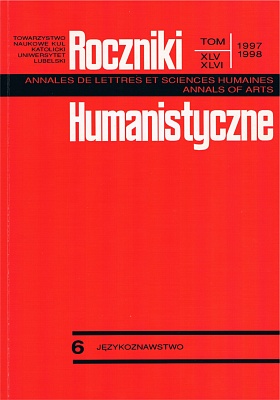O języku Kanonu augustiańskiego
Abstrakt
The Latin text of the mass canon was written before 1431, during the pontificate of Pope Martin V (1417-1431). What testifies to it is the letter M in the extract from the prayer for the pope: "Your servant s, papa nostro M"; there was only one pope in the 15th century with the name beginning with M. The Polish text was probably written in between the lines of the Latin text in 1436. What supports such an early date is the adjective kaliżdy with the retained li, no simplification of the consonant clusters in czso (cso?), bożski, wielmożstwo; the difference between the instrumental and locative of adjectives and pronouns was retained (instr. im, loc. em) and probably the soft consonants sz, ż, cz, c, dz, and rz.
In the canon there are 14 linguistic phenomena regarded as Masovian dialectal terms. It is sufficient to show the following: the change from ek to k (gen. plur. służebniczk, a characteristic of the whole of north Poland); the hardening of the consonant in the cluster śA (śwat, śwatłość, or, maybe, śfat, śfatłość); the change from śA into śwA is, as we know, the consequence of the production of softness from the labial consonants in the form of a separate soft consonant, most often j. We deem it necessary then to assume that the writer of the Canon spoke pjekło, ńebjosa, ofjera, wjara, mjeśćce and the like; the change of articulation of *y into the close or identical articulation with *i (biła [była - was], aside to bjiła [biła - she beat]); the hard k in comparison with ke (c'irkew [cerkiew - orthodox church]), apostolskej wyari - the apostolic faith, and the like). With these (and other) Masovisms there are a couple of Non-Masovian dialectal terms, the most important being lack of the Mazurian dialect. This kind of comparison of linguistic features occurs today, or occured until recently, only in the territory of the former Chełm-Dobrzyń land. What additionally testifies to this is, as it seems, the marking of the consonant š with the letters sch, according to the German spelling (the Chełm land was granted to the Teutonic Knights in 1228, the Michałów and Dobrzyń lands remained under their rule too; there were wars to regain them, and in 1466 they returned to Poland).
In chapter four, the last one, the author draws our attention to several facts which could be useful to the historian of the Polish langauge. In conclusion he writes about the very careful spelling of the writers of the Augustinian souvenirs: of the Canon and the Sermons, and also about the high values of their language.
Copyright (c) 1997 Roczniki Humanistyczne

Utwór dostępny jest na licencji Creative Commons Uznanie autorstwa – Użycie niekomercyjne – Bez utworów zależnych 4.0 Międzynarodowe.





